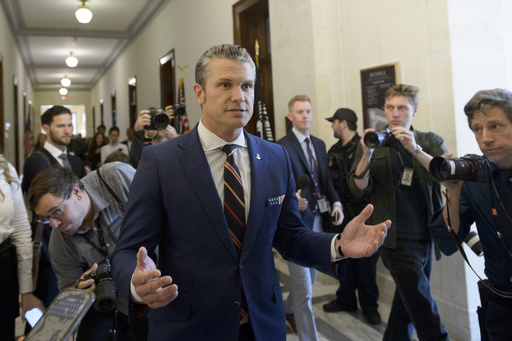
MARTIN, Tenn. — The withdrawal of a Cabinet nominee during the confirmation process is not an unusual occurrence for incoming presidents, as evidenced by previous administrations, including Donald Trump’s first term. The recent decision by Matt Gaetz to retract his candidacy for attorney general stems from ongoing scrutiny due to a federal investigation into sex trafficking. This situation hints at potential challenges the president-elect may encounter from within his own party, particularly involving nominees with questionable backgrounds or allegations of misconduct.
Shortly after Gaetz was selected, Senator Lindsey Graham, a member of the Judiciary Committee and a prominent ally of Trump, remarked that Gaetz would face “tough questions” during his confirmation hearing. Senator Lisa Murkowski from Alaska, a vocal critic of Trump, expressed her lack of confidence in Gaetz, stating, “I do not see him as a serious candidate.” Other nominees related to Trump are also under scrutiny for various allegations.
For instance, Pete Hegseth, nominated for defense secretary, has faced accusations of sexual assault made by a woman regarding an incident in 2017, which he has denied. Additionally, Tulsi Gabbard, a former Democratic congresswoman selected for the role of director of national intelligence, has attracted criticism for her sympathetic remarks towards Russia and her promotion of debunked theories about Ukrainian bioweapons. Gabbard, a military veteran and prominent Trump supporter for the 2024 campaign, has also faced backlash for her meetings with Syrian president Bashar al-Assad and her skepticism regarding Assad’s alleged use of chemical weapons against his own citizens.
Nikki Haley, Trump’s primary opponent in the recent GOP presidential race, voiced her objection to Gabbard’s confirmation, asserting that the position should not be held by someone who appears sympathetic to adversarial nations. Furthermore, she stated that Robert F. Kennedy Jr., Trump’s nominee for the Department of Health and Human Services, should be scrutinized because of his controversial stances on vaccines and public health issues. “He’s a liberal Democrat, environmental attorney trial lawyer who will now be overseeing 25% of our federal budget and has no background in healthcare,” said Haley. She emphasized the uncertainty surrounding the decisions Kennedy might make if given authority over the agency.
When the Senate reconvenes in January, Republicans are expected to hold 53 seats, allowing them to break any 50-50 ties with the upcoming Vice President, JD Vance. This dynamic means that if all Democrats oppose a nominee, at least four Republicans would need to oppose their party to halt any potential Trump selection.
Historically, every president has faced challenges with Cabinet nominations, including Trump himself. For example, Trump’s initial pick for labor secretary, Andrew Puzder, withdrew in early 2017 after revelations about tax-related issues and controversies regarding his treatment of workers and women in his businesses. Even recently, Puzder’s name has resurfaced as a potential candidate for a role in Trump’s second term. Trump’s first tenure was also marked by the dismissal of national security adviser Michael Flynn, who was let go over misleading statements regarding his conversations with Russian officials.
In the inaugural year of Trump’s presidency, Health and Human Services Secretary Tom Price resigned after reports of extravagant travel expenditures that drew scrutiny and frustration from the administration. The Brookings Institution noted that under Trump, there was a higher turnover among Cabinet members—14 individuals—compared to the eight departures seen during George H.W. Bush’s presidency.
Previous administrations have also faced similar hurdles with their Cabinet choices. Barack Obama experienced difficulty selecting a secretary of commerce, attempting three times before settling on a nominee. Bill Clinton wrestled with multiple choices for attorney general after his initial candidates withdrew due to their connections with individuals living in the U.S. without authorization. The Senate had previously rejected George H.W. Bush’s first choice for defense secretary, former Texas Sen. John Tower, following numerous allegations regarding his conduct.
